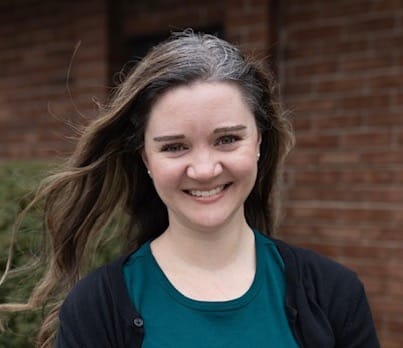NEXUS NEWS
Scenario Planning for Urban Futures spotlight: Nicole Williams
March 12, 2024
by Britney Rivers
Nicole Williams participated in the debut Scenario Planning for Urban Futures course in May 2023. She is currently the Director of Grant Management & Sustainability at the Ohio Alliance to End Sexual Violence. At the time she attended the course, she served as a consulting manager for the Ohio State University Center for Urban & Regional Analysis (CURA). Nicole shares her insights and takeaways from the program.

OPPORTUNITY TO LEARN
In Nicole’s previous role, she worked as a project manager and senior researcher. CURA researches sustainability issues, including transportation, housing, and food security. Nicole’s primary focus was overseeing urban sustainability projects and providing research services to partnered organizations to help their projects succeed.
Nicole learned about this course from a colleague who works closely with Heather Hannon from the Lincoln Institute of Land Policy. Heather is the Associate Director of Planning Practice and Scenario Planning at the Lincoln Institute of Land Policy and an instructor for the Scenario Planning for Urban Futures course. Nicole chose to join the course to learn new planning strategies to share with her colleagues.
She shared, “We don’t do a lot of short-range or long-range planning like normal city planners would do. However, we collaborate with different entities who do this type of work. For example, we partner with the City of Columbus and the Mid-Ohio Regional Planning Commission. The course piqued my interest because we can apply scenario planning concepts to our current and future projects.”
AN INTERACTIVE AND COLLABORATIVE EXPERIENCE
The Scenario Planning course is unique because it creates a collaborative environment between the in-person and remote participants. Virtual learners discussed ideas and strategies with in-person learners, offering different perspectives on industry topics. Nicole appreciated the interactive nature of the course and learning from others. “I enjoyed collaborating with the different participants. Many of the in-person cohort were from the Chicago Metropolitan Agency for Planning, so I was able to gain insight into their perspective. Collaborating with them and learning about some of the things they are doing and how they can build a strategic plan with scenario planning was impactful for me.”
While those actively working in a planning role can benefit greatly from the course, researchers and academics have a lot to gain too. Nicole was able to draw from her previous roles as a city planner and reflect on those experiences. Nicole said, “I was able to switch my mindset and ask questions based on my prior roles as a city planner. I discussed ideas with the class that worked in the city that I’ve worked for previously. In the future, if I ever go back to traditional city planning, I can take those ideas and concepts with me.”
THE POTENTIAL OF SCENARIO PLANNING
As an urban planning professional, Nicole is knowledgeable about the field. However, scenario planning is a fairly new concept to many city planners. Nicole says, “Even in my master’s degree in urban planning, we didn’t talk about scenario planning. This is the first time hearing about it and learning about alternative scenarios. Its potential to be used for long-range planning efforts intrigued me.”
Cities and local communities use scenario planning to visualize future scenarios and help implement action. Nicole plans to share the scenario planning knowledge with her colleagues and apply its principles to the real world. She shares, “Being in a research role, we don’t work with communities to troubleshoot city planning issues. However, some topics like housing and planning for climate change resonated with me. I can create a solid project using the themes I learned in scenario planning and thoroughly research it in real-time.”
In her previous role, Nicole played an active role in the geospatial analyses of projects, and scenario planning can help her explain the research. Effective research and analysis is a crucial step before city planners can begin constructing a city-wide initiative. The scenario planning process is used to accurately map out plans and serve as a starting point for potential urban planning research.
SHARING KNOWLEDGE WITH OTHERS
The Scenario Planning for Urban Futures course explores a unique tool not widely used in the field. Scenario planning helps guide city planners and researchers through times of uncertainty and kick-start new plans or projects into action. Nicole stated, “Being able to learn about scenario planning in this course and learn about my classmates’ experiences solidified the content of the course for me.”
The instructors, Dr. Robert Goodspeed and Heather Hannon, explored themes that are relevant to the projects urban planning professionals work on. Scenario planning can have a positive impact on construction planning, infrastructure management, community development, and many other facets of urban sustainability. For Nicole, scenario planning will be part of her toolkit going forward.